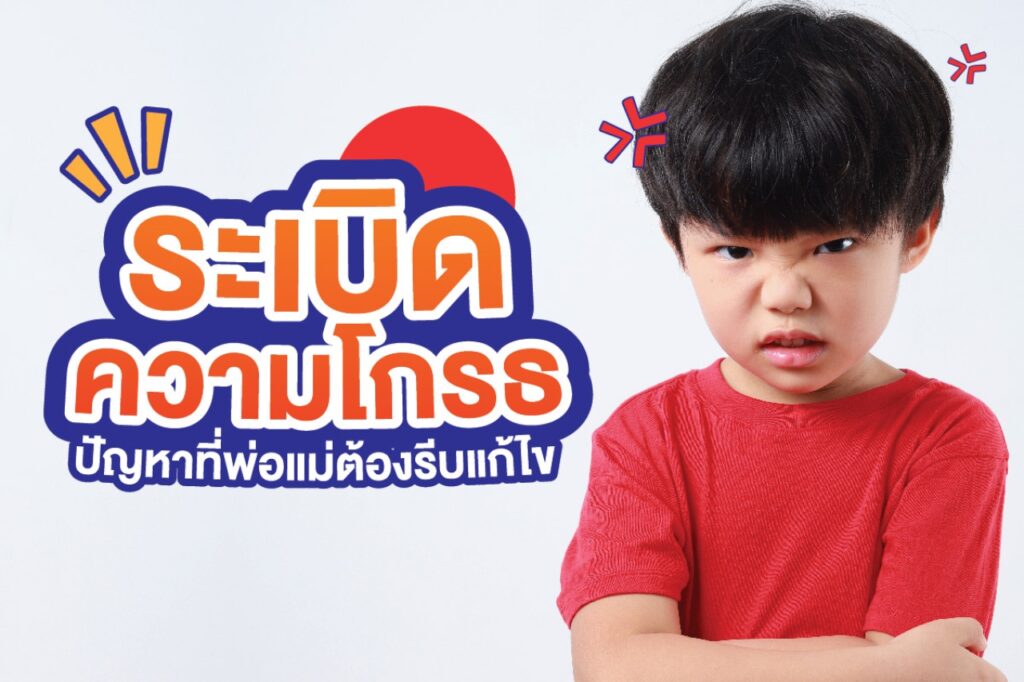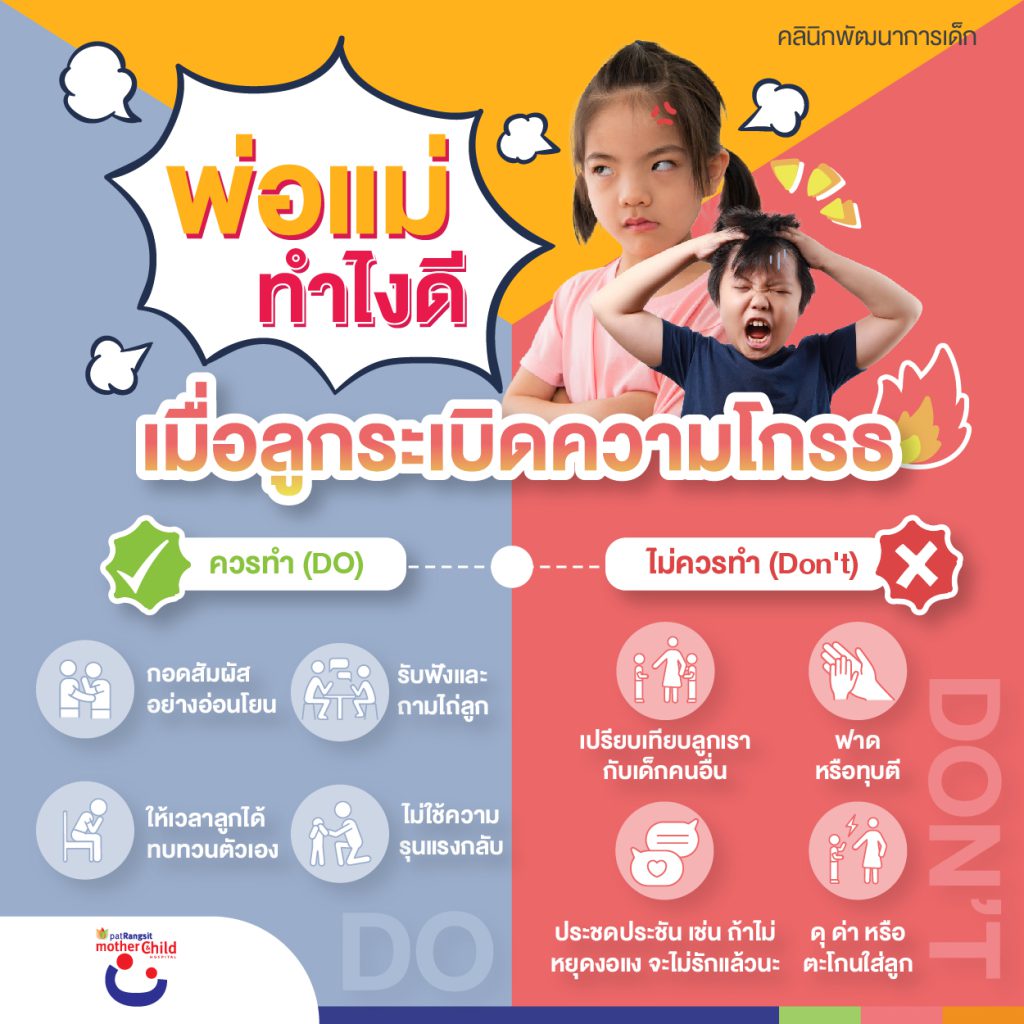
Explosions of Anger Problems that Parents Must Address Urgently by Dr. Chonnipa Butwong, Specialist in Child and Adolescent Psychiatry at PatRangsit Hospital.
This article discusses the disruptive behavior of children, what causes irritable and easily angered children, how to take care of them, and why we should pay attention and understand them. Many disruptive behaviors often manifest as anger and frustration, which are primary symptoms of Oppositional Defiant Disorder and Conduct Disorder. However, children with other psychiatric disorders are also at risk of exhibiting disruptive, angry, and aggressive behaviors.
Research studies have found that the prevalence of disruptive behaviors ranges from 14% to 35%. Particularly in children with ADHD, the prevalence can increase to 14% to 62%, and in children with anxiety, it ranges from 9% to 45%.
However, anger is a natural part of emotions, although it involves increased physiological arousal. Anger often leads to thoughts of blame towards oneself or others, as it arises from frustration or provocation. Anger can last from minutes to hours and ranges from mild anger to extreme anger. Crying, stomping, pushing, hitting, and kicking are common expressions of anger in children aged 1-4 years, occurring 5-9 times a week on average, with durations of 5-10 minutes. However, the intensity and frequency of anger tend to decrease as children grow and age.
Uncontrolled outbursts of anger are problems that need to be addressed to help children develop emotional control skills and cope with anger and frustration effectively.
Methods that can be used to manage anger include:
Allowing yourself to articulate your feelings honestly can help turn your anger into understanding. Self-awareness will be coupled with self-control. Dealing with anger is not easy, and anger control is something that must be practiced gradually and continuously. It may not be possible to completely manage all feelings of anger immediately, but it is important to learn to control your anger so that it doesn't overwhelm you.


บทความโดย
พญ.ชนม์นิภา บุตรวงษ์

"A mother's good intentions may sometimes trigger the symptoms of a child.”
Interview with the mother of a mental health patient, conducted by Doctor Chonnipa Butravong, Child and Adolescent Psychiatrist.
The beginning of seeking medical help
Mother: When my child was around 2 years old, I felt that he was different from other children. Due to my nursing background, I had some knowledge in this area, and reading books on mindfulness made me realize that my child was not typical.
I took my child to the hospital, and the doctor diagnosed him with Attention Deficit Hyperactivity Disorder (ADHD), which meant my child would not be able to stay still and sit in one place without moving. The doctor treated my child for about a year.
After we moved to a new house, during preschool, everything seemed normal. It was difficult to tell if there was anything abnormal. But when my child started grades 1 to 3, his academic performance deteriorated. He had difficulty understanding and comprehending what was being taught.
When my child reached grades 5 to 6, I took him to a psychiatrist due to his poor academic performance, suspecting a learning disorder (LD). The doctor prescribed medication, and at that time, my child's IQ test result was around 100.
In the early stages of high school, my child's academic performance improved because I helped and tutored him. The doctor suggested we try stopping the medication.
During the later years of high school, the same symptoms reappeared: poor academic performance and a lack of motivation. I took my child to the doctor again, and he underwent another IQ test when he entered university in their first year. The result was below 90.
My child's symptoms became severe during his university years. He experienced anxiety regarding exams and studying, which led to excessive crying and talking about the past. He would say that I didn't love them. I took them to a doctor who diagnosed him with bipolar disorder, but I disagreed and sought another opinion from a different hospital. The second doctor ruled out bipolar disorder and recommended behavioral therapy for my child.
What do you think of the phrase "go see a psychiatrist" = crazy?
It's simple. We have to think about our child. We want him to get better. We love him, and we don't care what others think. It has become more common in society nowadays, but initially, the father didn't understand. It might affect his mood sometimes, but he won't confront our child face-to-face. We, as parents, should discuss and handle it first, keeping our emotions in check.
The most important thing is love. We love him, understand him, listen to him, and make him trust us enough to talk and share their stories. We have to forgive him.
How do you cope with your child's emotions?
When my child is struggling and keeps crying, saying that I don't love him or that I abandoned him, I hug him and assure him that I am here. I let him speak first and listen to him.
When he struggles with understanding his studies, I study together with him, helping him with the content. I reassure him by saying, "We'll do this together." We need to instill confidence in him and believe that he can do it.
A mother's good intentions may sometimes trigger the child's symptoms.
We have good intentions for him because we care. Sometimes, we might unintentionally say or do something that triggers their symptoms. For example, asking, "Have you read the book yet?" We have to reflect on ourselves and see if we are the ones triggering them. We need to be the foundation for them and not forget about them. Sometimes, we might lose control and use harsh words or threats, but it's not beneficial. We have to remind ourselves to stay calm and speak gently to achieve better results. We need to be strong because we don't know the consequences of hurting them with our words.
How is your child doing now?
Currently, my child is studying online, and we have presentations to prepare. I am very excited, but my child remains calm. We have to practice and take it step by step. My child asks me frequently how he is doing if he has improved. I believe that if we provide him with more experiences, it will help. It all depends on perspective that we have to go through it together.
Do you have any messages for other parents?
For parents of children with ADHD or any other condition, we need to ask ourselves how we will support our children in the future and ensure that they can lead a happy life when we are not around. We may need to create an environment or help them discover their strengths and interests. We need to plan ahead.
Every child needs love, encouragement, and attention. We must not give up. We may have to sacrifice a little and do everything we can to make them feel normal.

บทความโดย
พญ.ชนม์นิภา บุตรวงษ์
เว็บไซต์นี้มีการใช้งานคุกกี้ เพื่อเพิ่มประสิทธิภาพและประสบการณ์ที่ดีในการใช้งานเว็บไซต์ของท่าน